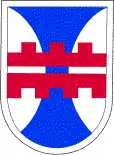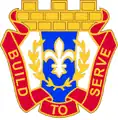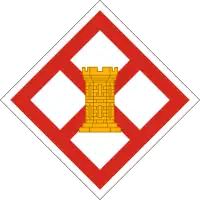412th Engineer Command (United States)
The 412th Theater Engineer Command (412th TEC) is a United States Army Reserve unit that conducts theater-level engineer operations for Eighth U.S. Army, Korea; U.S. Army Europe; and U.S. Army Pacific, supports continental U.S. – based engineer requirements as directed, and is prepared to participate in Joint and Combined regional contingency operations.
| 412th Engineer Command | |
|---|---|
 Shoulder sleeve insignia | |
| Active | November, 1924 – 25 October 1945 14 November 1947 – 11 February 1949 3 May 1949 – present |
| Country | United States |
| Branch | U.S. Army |
| Reserve Center | Vicksburg, Mississippi |
| Motto(s) | ”Build To Serve" |
| Engineer Corps Colors | Scarlet and White |
| Engagements |
|
| Decorations | Meritorious Unit Commendation (Army) Streamer embroidered EUROPEAN THEATER |
| Commanders | |
| Current commander | BG Todd Lazaroski |
| Insignia | |
| Distinctive unit insignia |  |
History
The 412th Engineer Command provides theater-level engineer support to the Combatant Commander in the event of a contingency operation. It is designed to command hundreds of engineer units and thousands of Soldiers in a war fighting capacity. The Command has historical training relationships in the Pacific and European theaters, and provides direct support to the Eighth US Army in Korea. The Command also is the Army Reserve's Executive Agent for Operation Sand Castle at Fort Irwin, CA, which is a 10-year urban terrain construction mission for engineer units conducting their Annual Training. Prior to mobilization, the 412th ENCOM is under operational control of the Headquarters, U.S. Army Corps of Engineers.
As an operational command, the 412th has 3 brigades and 96 other assigned units with approximately 10,000 Soldiers located throughout the southeast and northeast U.S. These units include the 926th Engineer Brigade, 411th Engineer Brigade, 302d Maneuver Enhancement Brigade, and the 314th Public Affairs Detachment (Press Camp Headquarters).
The Command was formed in the Organized Reserves in 1923, and served in World War II, earning the Meritorious Unit Commendation. In the 1990s, the 412th participated in Operation Joint Endeavor and Operation Joint Forge in Bosnia and Kosovo, and as part of the Hungary Joint Task Force East in several former Warsaw Pact and Soviet countries. 412th Soldiers have assisted with construction missions and supported joint exercises in Thailand, the Philippines, Vietnam, and the Marshall Islands. During the East Timor crisis in 2002, Soldiers from the 412th provided engineer support to the UN.
The 412th headquarters has deployed numerous detachments since the beginning of the Global War on Terror. In 2003, a detachment deployed as the Engineer Section for the Headquarters, U.S. Army Europe. In 2004, the CG and a small detachment supported the Multi-National Force in Baghdad. In 2005, the 412th deployed a design management section to support the 130th Engineer Brigade in Iraq. In 2006 and 2008, the 412th deployed task forces to augment the Gulf Region Division of the Corps of Engineers in Iraq. Currently, more than 800 of its Soldiers have deployed to Iraq. In 2009–2010, DCP 1 deployed to Afghanistan as part of Operation Enduring Freedom. The 412th provided engineering and logistical support for hurricane relief after Hurricane Katrina and Hurricane Rita devastated the Louisiana and Mississippi coasts in the late summer of 2005.
Current Structure
The current structure of the brigade, as of 2020, is as follows:[1]
- 412th Engineer Command, in Vicksburg, Mississippi
- 20th Military History Detachment, in Chattanooga, Tennessee
- 23rd Military History Detachment, in Chattanooga, Tennessee
- 322nd Military History Detachment, in Birmingham, Alabama
- 338th Forward Engineer Support Team, in Montgomery, Alabama
- 608th Engineer Detachment, in Vicksburg, Mississippi
- 206th LND, at Fort Jackson, South Carolina
- 207th Army Liaison Support Detachment, at Fort Bragg, North Carolina
 411th Engineer Brigade, in New Windsor, New York
411th Engineer Brigade, in New Windsor, New York
- 365th Engineer Battalion, in Schuylkill Haven, Pennsylvania
- 458th Engineer Battalion, in Johnstown, Pennsylvania
- 463rd Engineer Battalion, in Wheeling, West Virginia
- 479th Engineer Battalion, at Fort Drum, New York
- 854th Engineer Battalion, in Kingston, New York
 926th Engineer Brigade, in Montgomery, Alabama
926th Engineer Brigade, in Montgomery, Alabama
- 391st Engineer Battalion, in Greenville, South Carolina
- 467th Engineer Battalion, in Millington, Tennessee
- 478th Engineer Battalion, in Fort Thomas, Kentucky
- 841st Engineer Battalion, in Miami, Florida
- 844th Engineer Battalion, in Knoxville, Tennessee
- 926th Engineer Battalion, in Birmingham, Alabama
 302nd Maneuver Enhancement Brigade, in Chicopee, Massachusetts
302nd Maneuver Enhancement Brigade, in Chicopee, Massachusetts
- 368th Engineer Battalion, in Londonderry, New Hampshire
- 479th Chemical Battalion, in Far Rockaway, New York
- 533rd Combat Support Battalion, at Fort Totten, New York
- 382nd Military Police Battalion, at Westover Air Reserve Base, Massachusetts
Lineage
Constituted in July 1923 in the Organized Reserves as the 372nd Engineer Regiment.
Organized in November 1924
Redesignated 1 August 1942 as the 372nd Engineer General Service Regiment.
Ordered into active military service 20 December 1942 at Camp Claiborne, Louisiana'
Departed CONUS 14 August 1943
Arrived in England on 21 August 1943
Deployed to France 9 October 1944, and immediately entered Rhineland Campaign already in progress.
Unit disengaged from Rhineland Campaign to support Ardennes-Alsace Campaign on 16 December 1944.
Ardennes-Alsace Campaign concluded on 25 January 1945, and unit resumed engagement in Rhineland Campaign.
Rhineland Campaign concluded on 21 March 1945
Unit engaged in Central Europe Campaign on 22 March 1945
Unit Invaded Germany on 4 April 1945
Central Europe Campaign concluded on 11 May 1945
Returned to CONUS on 2 July 1945, and located at Fort Belvoir, Virginia.
Unit located at Fort Belvoir on 14 August 1945
Unit Inactivated 25 October 1945 at Fort Belvoir, Virginia
Headquarters and Headquarters and Service Company activated 14 November 1947 at Missoula, Montana
Organized Reserves redesignated 25 March 1948 as the Organized Reserve Corps
Unit Inactivated 11 February 1949 at Missoula, Montana
Headquarters and Headquarters and Service Company redesignated 3 May 1949 as Headquarters and Headquarters Company, 412th Engineer Brigade, and activated at Vicksburg, Mississippi
Organized Reserve Corps; redesignated 9 July 1952 as the Army Reserve
Unit reorganized and redesignated 15 January 1968 as Headquarters and Headquarters Company, 412th Engineer Command
Elements ordered into active military service in stages between 17 May 1996 and 1 December 1996 at Vicksburg, Mississippi.
Unit Released from active military service 10 February 1997 and reverted to reserve status
Elements ordered into active military service in stages between 2003 and 2010 in support of the Global War on Terror
Insignia
Shoulder sleeve insignia
- Description: On a round-bottomed shield 2 inches (5.1 cm) in width and 2+3⁄4 inches (7.0 cm) in height overall, within a 1⁄8 inch (0.32 cm) white border a vertical blue bar concave on each side on a white field; across the center of the shield two horizontal red bars the upper one with three crenellations upward and the lower bar with four crenellations downward.
- Symbolism:
- Scarlet and white are the Engineer's colors.
- The blue area denotes the Mississippi Valley affiliation and the crenellated red bars are reminiscent of the Engineer's castle, alluding to bridges and construction for which the Corps of Engineers is responsible.
- Background:
- The shoulder sleeve insignia was originally approved for the 412th Engineer Brigade on 8 November 1967.
- It was redesignated for the 412th Engineer Command on 5 February 1968.
Distinctive unit insignia
- Description: A gold color metal and enamel device 1 1/8 (2.86 cm) inches in height overall consisting of a modified white keystone bearing throughout a vertical blue bar concave on each side charged with a white fleur-de-lis within; overall, a gold wreath, enclosing all, at the top a gold castle wall with three projections, and a red scroll inscribed at the sides and base "BUILD TO SERVE" in gold letters.
- Symbolism: Scarlet and white are the colors for the Corps of Engineers. The fleur-de-lis within the laurel wreath refers to the historic World War II action for which the organization was awarded the Meritorious Unit Commendation, European Theater; and the embattled castle wall connotes the construction responsibilities of the Engineers.
- Background: The distinctive unit insignia was approved on 1 May 1975.
Honors
Campaign participation credit
- World War II:
- Rhineland,
- Ardennes-Alsace,
- Central Europe
- War On Terror:
- To Be Determined.
References
![]() This article incorporates public domain material from H&HC 412 Engineer Command Lineage and Honors. United States Army Center of Military History.
This article incorporates public domain material from H&HC 412 Engineer Command Lineage and Honors. United States Army Center of Military History.
- "U.S. Army Reserve > Commands > Functional > 412th TEC > 412thTECUnits". www.usar.army.mil. Retrieved 6 September 2020.
